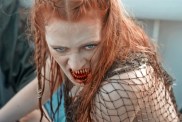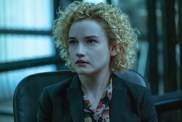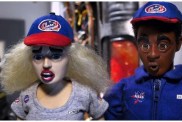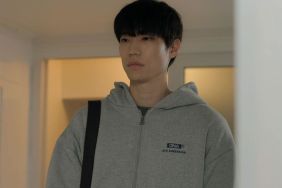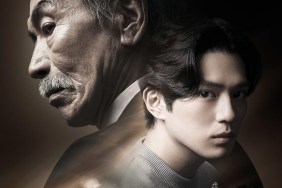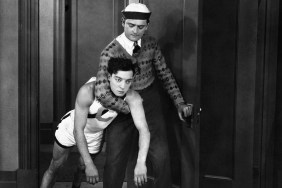There are many actors out there who have become the frequently unsung heroes of movies, actors who show up in so many different kinds of roles, mostly smaller supporting roles, but who always have an impact whenever they’re on screen.
Marton Csokas is one such actor, and even if the name doesn’t sound that familiar, you’ve almost certainly seen one of his movies, whether it’s The Bourne Supremacy, The Lord of the Rings, xXx, The Amazing Spider-Man or other movies where he’s likely to be playing a character very different from his last one.
And like the greatest of these actors, which includes the likes of Eddie Marsan, Mark Strong, Peter Stormare, Ben Mendelsohn and dozens of others, Csokas is not one to do a ton of interviews for one reason or another. Maybe because he’s too busy actually working to bother?
Csokas’ latest role is playing a Russian mobster named Teddy in Denzel Washington’s reunion with Training Day director Antoine Fuqua for The Equalizer. Teddy is not your typical Russian mobster stereotype though, as he’s quite a dapper dresser, well-spoken with very little signs of a Russian accent and actually quite polite. Until you refuse to answer his queries, and that’s when he starts showing the most violent behavior imaginable, the kind of violence that makes you wonder whether Washington’s Robert McCall stands a chance against someone so unpredicable.
In the interest of bringing CS readers the widest diversity of people working in show business, ComingSoon.net sat down with Csokas at the Toronto International Film Festival where The Equalizer premiered. We learned that he wasn’t nearly as scary as some of the character he plays, rather being quite eloquent and knowledgable about the craft of acting and how to create such memorable characters. (And yes, all the topics in the title for this interview are mentioned, if only briefly, in this interview. Promise!)
ComingSoon.net: I’ve been an admirer of your work for a long time
Marton Csokas: A deluded man. (laughs)
CS: Not really, no. One of the reasons I like your work is that a lot of time I’ll see your movies and wonder “Who is that guy?” and most of the time it’s you. You generally seem to be very different from one movie to the next is the long and short of it.
Csokas: Thank you.
CS: You don’t often do interviews at these things either. In “The Equalizer,” the character you play, Teddy, is just intense and crazy and scary. Can you talk about playing a character like this who seems nice and polite and then he just goes nuts?
Csokas: Well, he is polite and nice and that’s part of his charm, I think. That was important to find out the psychology and to avoid the scene-chewing Russian villain. I was very fortunate to be able to put down my audition outside of the usual process, although the casting director I knew a little and he’s a fantastic casting director. I got to think “Okay, how would I play this?” because there are many ways to play every role but I didn’t want him to be the typical bad guy, so I put that down on tape and I thought that either they’d like it or they won’t. Then I got called in to Los Angeles again and I met with Antoine. He loved it and we talked about this and that and we were on the same page straightaway and they liked it, so that was good. Then we just kept on building it and Denzel entered the conversation. I didn’t think I had it actually, but then I got it and that was good. What I’m trying to say is that the foundation for where I wanted to go, that’s where we were all headed, as opposed to saying, “Well, you’ve got to play it this way or that way” and that’s why I enjoy working with Antoine. It’s very open and I went down the sociopathic line. That was the most helpful piece of psychology that came out of the text actually, when Melissa Leo’s character says he’s a sociopath business card, and I just plunged my hooks into that. Okay that is a really strong anchor point and there’s a lot of books written on the subject: “The Wisdom of Psychopaths,” “The Psychopath Test,” “The Sociopath Next Door,” “Without Conscience” and they were very, very informative and fascinating and pleasurable to read. I would recommend all of those books.
CS: For people who want to learn how to become a sociopath?
Csokas: Well, we’re all human, we all share lots of different traits, and going down the list: frustrated, lack of empathy, lack of responsibility, and you think, “Wait a minute, there’s a few too many of these things that I can, at times, be like.” Not so much, but ultimately it’s someone without a conscience or the absence of love, this kind of thing, so finally, it led to a detachment really, but also understanding that someone like him can be all things to all people, he can be whatever he needs to be in certain circumstances. We seem in very extreme circumstances of his own admission, but if we saw him chatting up a woman or something, or going out to dinner with someone in that way, oh, it would be the perfect date. What would happen later may or may not be so nice, but I found that was very useful. And then taking that kind of information and playing with the text and just trying to find the off-key. He arrived at a very introverted quiet place as opposed to largesse and a more vulgar depiction, at least in mind, and giving him a continental Russian accent rather than a more overt one was useful. It gave him dexterity of mind and thought and he needed to keep up with a very formidable adversary in Robert McCall, Denzel’s character. He needed to sound quick, sharp and primally very instinctive, very animalistic, and do all the things that actors do, when they go off on animal tangents. Basically we just played with the text and tried to figure out how to make it work that was hopefully not obvious.

CS: I got the impression from talking to Antoine that it wasn’t very clear what Teddy was about other than a few lines about his past, that it was something more that you developed on your own after reading the script.
Csokas: The text was a leaping-off point and that’s always good to have, but Antoine is a very good collaborator. We talked a lot and it’s always good to be able to talk because if you’re not careful, you get stuck in your own head about things and when you arrive on set it’s like, “What the hell is he doing?” He was open and he communicated so to be able to go in there and for example, when Teddy went to McCall’s apartment, I really wanted him to have a Boston accent, because he’s a chameleon-like figure–sociopaths can be–so we’re in Boston and he plays the Boston detective and he’s there sniffing out his prey in an animalistic way. It was important that he did not come to the door as a Russian, that would just have been f*cking stupid and given the game away within the story, but also creatively. I really pushed for that. We had the conversations early on and I loved all that, so the producers let me fly. But I did that in conjunction with other departments for sure. Hair and make-up and the costume is an important part of this character and there’s sort of the Anglophile aspect. A lot of Russians live in London so that was a nice thread to draw upon, the sort of English tailoring. His egotism, that he would always believe that what he was doing was for the best purpose and probably what he was doing for everybody else was important for them (up until the point they died). The spectacle, it was eventful but it was very contradictory kind of behavior, not wanting to show any
Of course I feel remorse, but inside myself I’m not going to feel bad. There’s an absence of conscience and a cultivation of the absence of conscience in order to be able to do what he does. A lot of actors have that little voice that we all have that says, “Get rid of it, get rid of it,” so there’s a detachment in life, figuring out exactly what I think about that phone, your shoe, that watch
You can go on forever like that, but also to have fun with it.
CS: Are you able to detach yourself from a character like that?
Csokas: Important, yes, of course, of course. It’s a fun thing when all is said and done really, but yes, that’s important. Stanislavski is the Godfather of acting methodology, and he writes quite a lot about being careful not to blur the boundaries. If it’s starting to encroach into everyday life, I’ve learned, “You think, I think this is great, the character’s really working so I better stay in it.” Uh-uh
at least not for me. No, it’s not healthy. There’s a whole other life that I need to have, so I go into little rituals and little practices. You work very hard and very concentratedly and then you hang the character up as if you hang it up on a coathanger and go “Bye bye,” then go and read something different that’s completely contrary. Go for a bike ride, go into nature
CS: Watch an Adam Sandler comedy or something.
Csokas: (with WAY too much enthusiasm) That’s right! It’s really, really important and then you let your subconscious work as well. You have all that time, and I have a lot of different exercises, play out the scenes a thousand times and from different angles and then just STOP and have a nice dinner or something, hang out with friends, watch a comedy. That’s really helpful.
CS: One of my favorite scenes is when Teddy interrogates one of the prostitutes to try to find the location of Chloe Moretz’s character. It was a scene that made me so uneasy and so uncomfortable. We’d already seen what he could do and this was a long, extended scene where you spend the entire time wondering, “What is he going to do to her?” What was that like to shoot? Were there a lot of long takes or was it the usual thing of breaking it up into different angles, etc.?
Csokas: That was my first day and Haley Bennett’s first day, too. We had not rehearsed that outside. We had met the night before and had a drink together and said “Hi.” She had done her own preparation, but we got on really well. That’s vital, but we were looking after each other, because it’s not easy to go through all of that, being strangled all day, it’s horrible, but we were looking out for each other. That’s important in my book. You gotta look out for each other. The whole method thing is bullsh*t in that regard, because what? Somebody is made to suffer all day because you think somebody’s going to strangle you? No, it’s horrible. It’s irresponsible. We had a nice vibe and again with Antoine directing it, there were lovely things that happened in that and we just started to play around with it and there was a lot of improvisation, which is always where backstory is very useful. The key to that scene for me came with the discovery of what the set dresser had put on the mantelpiece, very kindly. There was a little Faberge egg. In rehearsal, I was just going through things, because we had to wait for something. There was this beautiful naivety that came out of it, which is very much about what the scene’s about: vulnerability, a child’s lullaby, trying to gain something that you want, a fairy tale quality. I thought, “Oh God, I should use this” and (Antoine) said “Yeah, yeah.” We talked about what it was like in the summertime. This girl was obviously homesick, she’s alone and doing all the things she was doing, and we just sort of got into that. We started to talk to each other and improvise: Cherries in the summer, swimming in the lake, mother, brother, sister. None of that ended up being (used)–I wish it had because it all was quite eloquent and poetic and possibly maybe too much, I don’t know, but it certainly contributed to what we were doing. These are the things around the experience of that day.

CS: And then with Antoine’s editing, it ends up like what we see on screen, which is this fantastic sequence that creates unbelievable amounts of tension. That’s quite amazing.
Csokas: Yes, and the cinematography is stunning, the way they come out at the end is great.
CS: You’ve done so many different movies big and small. I’d love to talk to you about all of them, but I particularly liked “Asylum.” Not many people have seen it, but for my colleagues who have recently seen David Mackenzie’s new movie “Starred Up,” I’m steering them to try to find that movie since it’s quite different, showing what David is capable of as a more cinematic filmmaker.
Csokas: David is wonderful. I loved working with him on that film. No, I’m glad you liked that, but not a lot of people have seen it because at the time Paramount was dividing and they had a big reshuffle and it almost got completely lost. It didn’t get good publicity, and I think it’s downbeat ending was not deemed to be particularly good for America, so they didn’t put any money behind publicizing it, but I’m really pleased with that film, very proud of it and so happy to have been involved with it.
CS: The nice thing about movies is that they never truly go away, and someone will find it eventually. I wanted to ask you about playing Dr. Kafka in “The Amazing Spider-Man 2” earlier this year. It was a smaller role, but there were some rumors I’d been hearing–and you might not be able to say much before the Sony SWAT team breaks through the window–that maybe the character will have some involvement in forming the “Sinister Six.”
Csokas: Well, it’s news to me, but I’m all for that. I had a great experience on the set with Marc Webb. I had a great time, but we shot about 80% more. I haven’t seen it, because I understand that there are only about two scenes (left) and I had such a lovely time making it, and I don’t want to go in and go, “Oh, yeah, but what about all that beautiful stuff we did?”
CS: I was wondering whether there was more to the character than we saw, because he just sort of shows up
Csokas: It wasn’t a huge role in the first instance, but there was a beginning, middle and an end and we improvised a lot, walking down corridors and such, and it was so much fun. There was some black comedy and I was allowed to do (what I wanted). I was thinking somebody was going to tap me on the shoulder and go, “You need to reign it in,” but on the contrary, he said, “Yeah! Keep going, keep going!” So I had nothing but a good time and that rumor? I hope that’s true.
CS: I feel like there’s more to this guy than what we saw in the movie.
Csokas: I hope so. I had a great time with him. He was dark and comedic. It’s very much the comic book character and with the make-up, I was able to get into the silent comedy and all the G.W. Murnau films, “Nosferatu” being one of them, and go down that track, to sort of mine all the old expressionistic films. “Sunrise” is one of my favorite films. I love all that cinema. To me, German expressionist cinema is one of the most beautiful. “Sunrise” and Fritz Lang’s “Metropolis” and all that stuff. It’s still a carryover from the silent era and I used a lot of that. The make-up department went right for it. And there was a little bit of Dr. Strangelove, Peter Sellers in there, and there’s a pseudo-sexual bent and the Nazi reference. We layered lots and lots of things.
CS: It sounds so intriguing, I’ll have to see if they have any of that as an extra on the Blu-ray.
Csokas: There were a lot of stories in that film and I think maybe they went “Okay”
I dunno. What people did was fantastic. I’m speaking very selfishly. I’m sure it’s a great film.
CS: Anything else you’ve done lately that you’re excited about? I’ve read you’re doing TV these days.
Csokas: I finished something called “Sons of Liberty” for the History Channel about the American Revolution. Horses and swords and the emancipation of the U.S. from England. Yeah, it was a swashbuckling, broadstrokes tale, and I get to ride lots of horses. I love horses, and I got to work with some lovely people.
The Equalizer opens for previews on Thursday night, September 25, and can be seen in regular and IMAX theaters nationwide starting Friday. You can watch our video interview with director Antoine Fuqua here.
(Photo Credit: Brian To/WENN.com)
